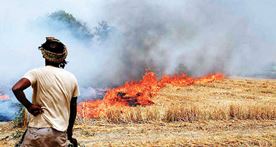
To prevent the crop residue burning during Kharif-2020 especially amid Covid-19 pandemic, the District Administration has appointed Nodal Officers for paddy growing villages where paddy stubble was being traditionally put to fire.
Seeking wholehearted support and cooperation from the farmers, the Deputy Commissioner (DC) Ludhiana Varinder Kumar Sharma on Wednesday, appealed them to refrain from burning paddy straw especially due to outbreak of Covid-19, which can further lead to serious implications in aggravating the health issues of those people who are already suffering from several diseases.
ਆਹ ਦੇਖੋ ਕਿਸਾਨਾਂ ਨੇ ਦਿਖਾਤੀ ਆਪਣੀ ਤਾਕਤ,ਕਰਤਾ ਅੰਬਾਨੀਆਂ ਦਾ ਪੈਟਰੋਲ ਪੰਪ ਬੰਦ?ਫੇਰ ਕਹਿੰਦੇ ਅਜੇ ਤਾਂ ਸ਼ੁਰੂਆਤ
Deputy Commissioner further said that the State Government has decided that there is a need to pull out all stops and fully involve administrative machinery for “on the ground’ activities at the village level. Therefore, nodal officers have been appointed for each village where the paddy is grown and its stubble is being burnt.
Deputy Commissioner also mentioned that these Nodal Officers would perform their duties in their concerned villages to control of stubble burning during harvesting period till November 15. The staff of Cooperation, Revenue, Rural Development & Panchayats, Agriculture, Horticulture and Soil Conservation Departments and Punjab Pollution Control Board besides Guardians of Governance would be closely coordinate to further intensify efforts to stamp out the unhealthy practice of stubble burning in Punjab.
Deputy Commissioner stated that these officers have been assigned the task to ensure that harvester combines operate in the villages only with Super SMS system properly installed on them. They will also prepare the list of owners who have given their land on rent (theka) and then call each landowner on phone to impress upon them to ensure that no paddy straw is burnt on their land, otherwise, the red entry shall be made in land record.
These Officers will also identify those farmers who are likely to put fire to the paddy residue and to convince them by the way of one to one contact. They would also get to know the farmers who have burnt the residue and ask the revenue patwari of the village to make a relevant entry in Revenue records as per separate instructions issued by the Revenue Department.
Apart from these steps, the Nodal Officers will create awareness in villages by way of holding meetings with farmers, to help arrange CRM machines in the village, to distribute pamphlets/leaflets etc in the village, to make announcements in Gurdwara or by other modes, to interact with village schools for awareness lectures to students so that these students can further create awareness among their parents, to identify those farmers who are likely to put fire to the paddy residue and to convince them by the way of one to one contact.
Deputy Commissioner also stated that various sites have been identified/ earmarked in the district for Collection of residues in Common Lands /Cattle Ponds and Gaushalas, where farmers or any entrepreneur will be able to store Paddy Straw. This stored basmati residue can be transported to places where they can be used as cattle fodder.
The Deputy Commissioner informed that the state government has embarked upon a massive program for the management of paddy straw without burning. As part of this, about 23500 more agri-machines are being provided this year in the state and 51,000 paddy straw in-situ management machines were given to the farmers in the last two years either individually or in groups or through cooperative societies at a subsidy ranging from 50% to 80%.
Notably, the paddy has been grown in 27 lac hectares of land in Punjab which includes cultivation of Basmati on 7 lac hectares and paddy residue of 16.50 million tons shall be produced out of paddy crop.



